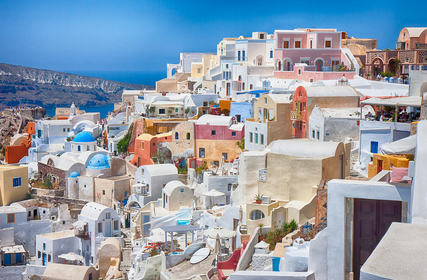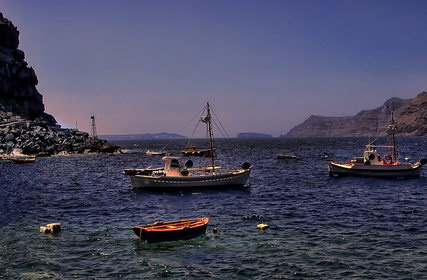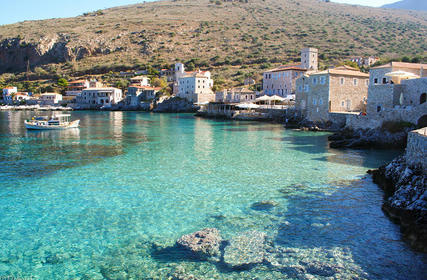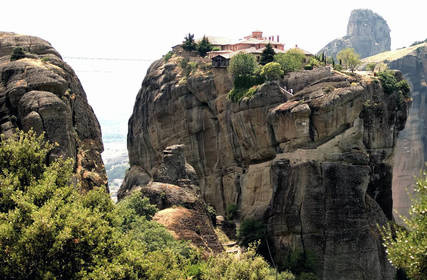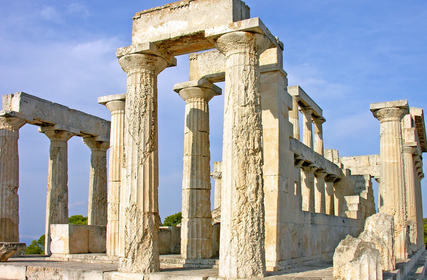Most popular locations in Greece
Greece is a fascinating country to discover and conjures up images of mythology, archaeological sites, magnificent historical museums and islands scattered with beautiful beaches, rocky coves and limestone cliffs.
Determined to emerge stronger than ever from economic turmoil, Greece is a major tourist destination and you’ll be impressed by the friendly people, excellent attractions and delicious food made from island produce or ocean fresh seafood.
A brief history
Greece has developed over millennia in its own way, and it has left a country rich in archaeological history, preserved ruins and a strong sense of self.
From Minoan settlements to prolific arts and literature during the Classical Period, Greece has absorbed elements of different cultures and adapted to what you see and experience today.
Politically, Greece has fallen under Persian, Roman, Byzantine and Ottoman rule and in modern times political relationships with residents continue to be edgy and unsettled.
Greece joined the European Union in 1981 and adopted use of the Euro in 2001, but the country is battling economic reforms and it may well be the residents who rely on family units for support and identity who pull Greece through via small enterprises and family-run businesses.
When to go
The best weather in Greece is between June and September when the days are sunny and hot, though this coincides with the peak tourist season so you’ll experience crowds at major points of interest, higher prices and more traffic.
For sightseeing, spring (May and early June) or autumn (late September and October) is great as the weather is still pleasant but the crowds are fewer. You may not be able to swim in early May or October as the waters may not be warm enough but the lack of crowds will make up for any drop in sea temperature.
Low season is generally between December and March and the weather is much colder with some rain. You’ll have to be savvy at planning too as there are less hotels open during the off season plus limited transport options especially concerning ferries and flights.
Getting around
Greece is comprised of the mainland, the Peloponnese Peninsula and around 6000 islands so transport options are varied.
Buses are most popular because they are inexpensive but are frequently crowded especially in main cities and towns. Trains are slower than Western Europe trains, and it’s advisable to book any tickets and seats in advance or a surcharge may be added on board. Domestic flights are excellent for travellers with limited time, though research prices before you book. Ferries are extremely popular for travel between Greek’s network of islands and peak season sees frequent schedules. Be warned that ferry schedules in shoulder season or off season are tentative or limited.
A rental car is a good option for touring Greece, especially outside Athens where public transport timetables are random. If you require a vehicle with automatic transmission, it is highly advised to reserve a vehicle in advance. Always invest in a good map (or have a GPS system), fuel up your car before venturing long distances and if you intend to take your rental car onto a ferry get written permission from the rental agency.
Meet the locals
Greek people are considered to be family-orientated, friendly and hospitable. You may find yourself involved in an animated conversation at a taverna or coffee house. You can meet locals at a Greek festival where there is usually dancing and eating.
Head to an open air theater or cinema screening which are often held in spectacular locations with archaeological heritage. Or simply stroll through a local market where you can chat to the vendors as you buy juicy figs, ripe olives, fresh octopus or a bottle of Greek spirits.
Culture & customs
Greece has regional differences but a firm culture and customs linked to a strong relationship to the Mediterranean environment and based around dance, food, religion and family.
Greeks love to celebrate life and can party with the best of them! Join in with Greek dancing and singing at expressive festivals.
Sample the bounty of centuries of agricultural and fisheries knowledge by eating moussaka, baklava or grilled mackerel.
Alongside food, special celebrations are important to Greece particularly religious events such as Carnival (with parties and costumes) and Easter.




